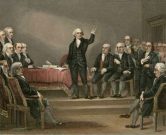Mark Pulliam rightly criticizes nonoriginalist judicial activism but wrongly would depart from the original meaning in other cases.
More on Judicial Activism
Over at the Originalism Blog, Mike Ramsey responds to my engagement with his prior post on judicial activism. Mike has two main arguments for his understanding of judicial activism as the strong exercise of judicial review rather than as an unjustified exercise of judicial review: (1) people disagree on what is an unjustified exercise of judicial review, and (2) judicial restraint is the opposite of judicial activism and judicial restraint is not the same as following the law. In the interests of not excessively prolonging the debate, I will try to keep my reply brief as possible.
My main response is that Mike doesn’t engage with my main prior point, which is that judicial activism has a variety of meanings — as Larry Solum says — and that it would confuse people for me to use the term to describe originalism (since they would seem to think I was criticizing it). It is better to use a new term, especially because judicial activism is so contested. I suggested strong and weak exercises of judicial review, but other possibilities may be better.
Mike is correct that judicial restraint, as the opposite of judicial activism, appears to support his understanding of judicial activism, but all that shows is that the judicial activism/judicial restraint dichotomy is part of the understanding of judicial activism that he supports. That does not mean that it is the best understanding of judicial activism. But even the support he derives from judicial restraint is not that strong. People who defined judicial activism as the opposite of judicial restraint favored judicial restraint and therefore part of their definition of judicial activism was improper judicial action. If we don’t agree with them about recommending judicial restraint, there is a good reason not to confuse matters by using judicial activism as the opposite of restraint.
Finally, I was curious how the dictionary defined judicial activism. According to Wikipedia, Black’s law dictionary defines it as a “philosophy of judicial decision-making whereby judges allow their personal views about public policy, among other factors, to guide their decisions.” The Free Dictionary online defines it as”an interpretation of the U.S. constitution holding that the spirit of the times and the needs of the nation can legitimately influence judicial decisions (particularly decisions of the Supreme Court).” Other definitions on line are similar. These are obviously not dispositive as to the proper definition, but they do suggest the confusion that would be created by an originalist describing originalism as judicial activism.

